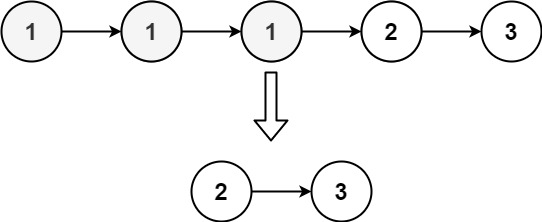Problem 82 Remove Duplicates From Sorted List II
Table of Contents
Problem Statement
Link - Problem 82
Question
Given the head of a sorted linked list, delete all nodes that have duplicate numbers, leaving only distinct numbers from the original list. Return the linked list sorted as well.
Example 1

Input: head = [1,2,3,3,4,4,5]
Output: [1,2,5]
Example 2

Input: head = [1,1,1,2,3]
Output: [2,3]
Constraints
- `The number of nodes in the list is in the range [0, 300].`
- `-100 <= Node.val <= 100`
- The list is guaranteed to be sorted in ascending order.
Solution
/**
* Definition for singly-linked list.
* struct ListNode {
* int val;
* ListNode *next;
* ListNode() : val(0), next(nullptr) {}
* ListNode(int x) : val(x), next(nullptr) {}
* ListNode(int x, ListNode *next) : val(x), next(next) {}
* };
*/
class Solution {
public:
ListNode* deleteDuplicates(ListNode* head) {
if(head == nullptr || head->next ==nullptr)
return head;
ListNode* dummy = new ListNode(-1);
dummy->next = head;
ListNode* prev = dummy;
ListNode* curr = head;
while(curr != nullptr && curr->next!=nullptr){
if(curr->val != curr->next->val){
prev = curr;
curr=curr->next;
}
else{
while(curr!=nullptr && prev->next->val == curr->val){
curr = curr->next;
}
prev->next = curr;
}
}
return dummy->next;
}
};
Complexity Analysis
| Algorithm | Time Complexity | Space Complexity |
| ------------ | --------------- | ---------------- |
| Two Pointers | O(n) | O(1) |
Explanation
1. Intuition
- The logic is follows.
- Add a dummy node behind the head.
- `prev` points to dummy.
- `curr` points to dummy->next or head.
- until the `curr` and `curr->next` is not `nullptr`
- if value of curr is not equal to the value of next of curr
- increment prev to curr
- increment curr to next of curr;
- else while value of next of prev is equal to value of curr
- increment curr
- set prev to curr
- return dummy->next;
2. Implementation
- Initialize a `dummy` node behind the `head`.
- `dummy->next` points to `head`.
- `prev` points to `dummy`.
- `curr` points to `head`.
- until the `curr` and `curr->next` is not `nullptr`
- if value of curr is not equal to the value of next of curr
- increment prev to curr
- increment curr to next of curr;
- else while value of next of prev is equal to value of curr
- increment curr
- set prev to curr
- return dummy->next;